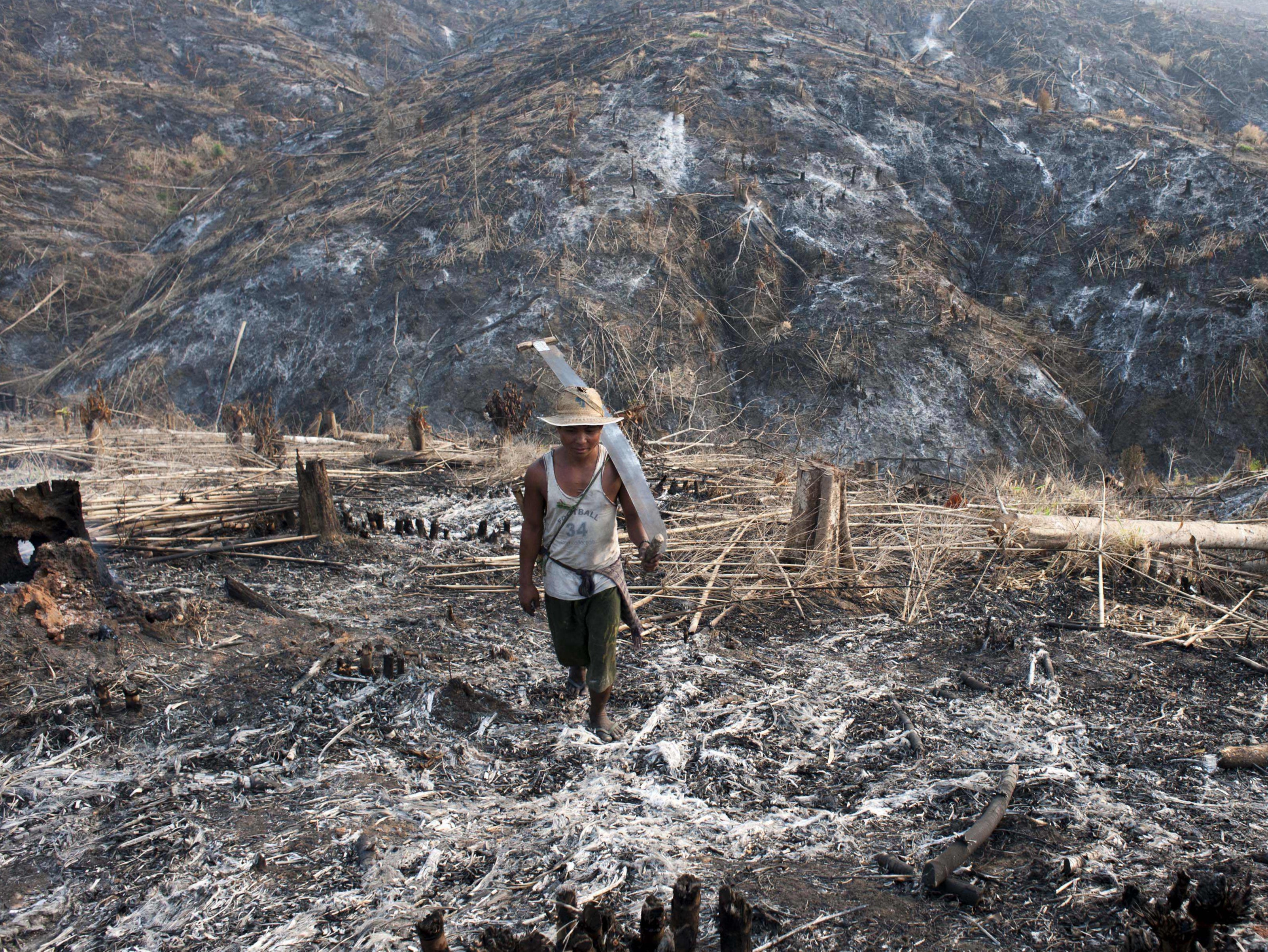Climate crisis: Area of forest twice the size of UK cut down in just over a decade, WWF report reveals
Commercial agriculture is leading cause of deforestation around the world, researchers say

An area of forest twice the size of the whole UK has been razed in just over a decade in the world’s deforestation hotspots, a disturbing report by WWF has revealed.
Commercial agriculture was the leading cause of deforestation across the 24 “deforestation fronts” the research team analysed, with hundreds of thousands of square miles of forest chopped down to create space for livestock and grow crops.
Other main drivers of large-scale deforestation include road building, mining and land speculation.
Across 29 countries in Asia, Latin America and Africa, a total of 43 million hectares of forest and other critical natural ecosystems were destroyed between 2004 and 2017.
Nine of the 24 worst affected areas are in Latin America, a region which has experienced a “devastating” 94 per cent decline in wildlife populations since 1970, the WWF said.
Five of the deforestation fronts are in the Amazon rainforest, which scientists have repeatedly warned is reaching a “tipping point”, resulting in catastrophic collapse of the forest ecosystem.
Scientists fear losing a further 5 per cent of the rainforest could mean it will no longer be able to sustain itself and would rapidly deteriorate to become a drier ecosystem, leading to runaway climate change.
The WWF said the extensive habitat destruction was not only of the leading causes of biodiversity loss, as animals lose the ecosystems which support them, but are also becoming an increasing threat to human life due to outbreaks of emerging infectious diseases such as Covid-19.
“As wild habitats are destroyed, the risk of a zoonotic disease event is increased, as humans and livestock are driven into closer contact with wild animals,” the researchers said.
Tanya Steele, chief executive at WWF, said: “Nature is in freefall and our climate is changing dangerously – protecting precious forests like the Amazon is a vital part of the solution to this global crisis.
“We have an opportunity to stop the things we buy and the food we eat here in the UK from causing the destruction of nature overseas.”
She called on Boris Johnson’s government for “urgent action” to implement new laws to ensure deforestation is forced out of supply chains for products sold in Britain.
“The UK will then be able to show true leadership as hosts of the global climate conference in Glasgow later this year.”
Just 8,000 years ago, forests covered about half of the Earth’s land area, but today only 30 per cent of land remains forested, with rates of deforestation continuing at an alarming pace, particularly in regions that are home to some of the world’s most vulnerable communities and endangered wildlife.
The WWF report says a key route to reducing deforestation is for governments to secure the rights of indigenous peoples and local communities, putting more forests under their control and helping to ensure the conservation of biodiversity-rich areas.
“A multi-pronged approach, with public, private and community efforts is the key to halting global deforestation, forest degradation and the destruction of other natural ecosystems.”
Awapy Uru-eu-wau-wau is a cacique or chief of the Uru-eu-wau-wau indigenous peoples in central Rondônia, Brazil. He is the head of the surveillance team responsible for overseeing their indigenous land, to record loggers’ invasions and illegal deforestation.
He said: “We face two problems from invaders – deforestation, and fires. These give us a lot of trouble. The deforestation especially keeps on going and causing us trouble. Every time they chop down the jungle, they get closer to the village.
“Nature is important to me because I was born in the jungle, I grew up in the jungle, and my father taught me how to deal with nature. Nature, for us, is the life of the Indian. Why? It gives pure oxygen, it gives natural food to us, hunting, fishing, native fruits of the jungle, medicine, so it is important to us, because we live off the jungle.”
The WWF said it is calling on the government to use the new Environment Bill to implement stronger measures to remove all deforestation and habitat conversion from the forest risk commodities we import such as soy, palm oil, and derived products by 2023.
“This would ensure the Bill requires businesses operating in the UK – including financial institutions – to carry out due diligence to ensure their global supply chains and investments are not linked to the destruction of habitats such as forests and savannah,” the organisation said.
Join our commenting forum
Join thought-provoking conversations, follow other Independent readers and see their replies
Comments
Bookmark popover
Removed from bookmarks